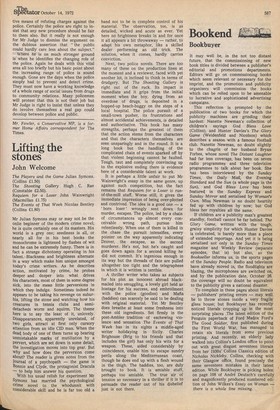Bookend
Bookbuyer
It may well be, in the not too distant future, that the commissioning of new book titles is divided between a publisher's editorial and promotions departments. Editors will go on commissioning books which seem relevant or necessary for the imprint, and the promotion and publicity organisers will commission the books which can be relied upon to be amenable to lucrative and sophisticated advertising campaigns.
This reflection is prompted by the publication of two books for which the publicity machines are grinding their hardest: Nanette Newman's collection of children's sayings God Bless Love (Collins), and Hunter Davies's The Glory Game (Weidenfeld and Nicolson) which describes a season with a famous football club. Nanette Newman, no doubt slightly to the chagrin of her husband Bryan Forbes, whose novel The Distant Laughter had far less coverage, has been on seven radio programmes and three television programmes to talk about her book. She has been interviewed by the Sunday
Times, the Daily Mai1, the Evening
Standard and the Sun (a whole page in the Sun), and God Bless Love has been featured in the Sunday Express and Sunday Mirror and serialised by Woman's Own. Miss Newman is no doubt heartily fed up with children by now; but God bless her royalties all the same.
If children are a publicity man's greatest standby, football cannot be far behind. The Glory Game, written with the tough, grainy simplicity for which Hunter Davies is celebrated, is barely more than a piece of extended reportage. And yet it is being serialised not only in the Sunday Times magazine and Weekly Review (separate episodes, that is) but also, so the Bookseller informs us, in the sports pages of the Sunday People. Radio and television have already moved in, the floodlights are blazing, the microphones are switched on, and by the publication date, October 26. the coverage will no doubt be equivalent to the publicity given a national disaster.
To complain in these pages about literals — publishers' printing errors — may well be to throw stones inside a very fragile glass house; but Bookbuyer has recently noticed literals cropping up in the most surprising places .The latest edition of the Penguin paperback of Ford Madox Ford's The Good Soldier, first published during the First World War, has managed to retain six literals from some previous printing. And recently, an elderly lady walked into Collins's London office to point out with great disgust seventeen literals from her 1930s' Collins Classics edition of Nicholas Nickleby. Collins, checking with their Glasgow office, found precisely the same seventeen mistakes in their latest edition. While Bookbuyer is picking holes: on page 108 of Andre Deutsch's carefully and magnificently produced numbered edition of John Wilkes's Essay on Woman --there is a whole line missing.














































 Previous page
Previous page